2009年广东省中考英语试题、参考答案及评分说明
2009年广东省湛江市中考英语试题及答案(word版)

湛江市2009年初中毕业生学业考试英 语 试 卷本试卷满分为135分。
考试用时80分钟。
注意事项:1、答卷前,考生务必用黑色字迹的钢笔或签字笔将自己的姓名和准考证号等相关信息填写在答题卡上。
2、选择题每小题选出答案后,用2B 铅笔把答题卡上对应题目的答案标号涂黑;如需改动,用橡皮擦干净后,再选涂其他答案;不能答在试卷上。
3、非选择题必须用黑色字迹钢笔或签字笔作答,答案必须写在答题卡各题目指定区域内的相应位置上;如需改动,先划掉原来的答案,然后再写上新的答案;不准使用铅笔和涂改液。
不按以上要求作答的答案无效。
4、考生必须保持答题卡的整洁,考试结束,将本试卷和答题卡一并交回。
I. 听力 (共三节,满分20分)做题时,先将答案划在试卷上。
录音内容结束后,你将有两分钟的时间将试卷上听力选择题的答案转涂到答题卡上,将“听对话或短文获取信息”的答案填在答题卡标号为16—20的空格中。
第一节: 听对话选图画(共5小题,每题1分,满分为5分)听下面5段对话,每段对话后有一个问题,听完后,从题中所给的A 、B 、C 三幅图画中选出符合对话内容的图画,并在答题卡上将该项涂黑。
每段对话听一遍。
听第1段材料,回答第1题。
1. What does the girl want to buy?AB C听第2段材料,回答第2题。
2. What does Jim like playing?AB C 听第3段材料,回答第3题。
3. When is the woman arriving?A B C 听第4段材料,回答第4题。
4. How much is the MP3?A. B. C.听第5段材料,回答第5题。
5. Where is her pen pal from?A B C第二节:听对话或短文选答案(共10小题,每题1分,满分为10分)听下面对话或短文,每段对话或短文后各有几个问题,从题中所给的A 、B 、C 三个选项中选出最佳选项,并在答题卡上将该项涂黑。
2009年广东省深圳市中考英语试题(Word版-有答案)学习啊
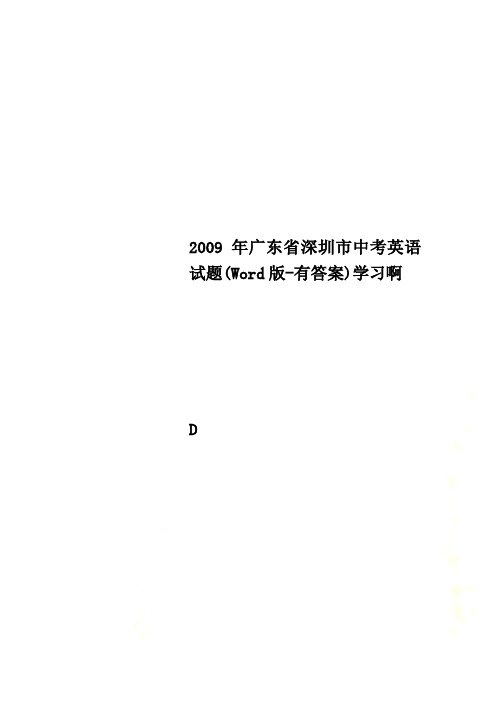
2009年广东省深圳市中考英语试题(Word版-有答案)学习啊D只几句话:但wish的几种用法已跃然纸上,这样写下来印象会深刻得多,这样比死记硬背wish的用法也有趣轻松的多。
学习英语不用花大块的时间,10分钟的散步可以练"说",吃完饭后可以读一会儿英语小说,睡前听几分钟英语,可以使你得到更好地休息……只要你每天抽出一些时间来练英语,你的英语成绩肯定会很快提高的。
背英语单词技巧1、循环记忆法艾宾浩斯遗忘曲线人的大脑是一个记忆的宝库,人脑经历过的事物,思考过的问题,体验过的情感和情绪,练习过的动作,都可以成为人们记忆的内容。
例如英文的学习中单词、短语和句子,甚至文章的内容都是通过记忆完成的。
从"记"到"忆"是有个过程的,这其中包括了识记、保持、再认和回忆。
有很多人在学习英语的过程中,只注重了学习当时的记忆效果,孰不知,要想做好学习的记忆工作,是要下一番工夫的,单纯的注重当时的记忆效果,而忽视了后期的保持和再认同样是达不到良好的效果的。
在信息的处理上,记忆是对输入信息的编码、贮存和提取的过程,从信息处理的角度上,英文的第一次学习和背诵只是一个输入编码的过程。
人的记忆的能力从生理上讲是十分惊人的,它可以存贮1015比特(byte,字节)的信息,可是每个人的记忆宝库被挖掘的只占10%,还有更多的记忆发挥空间。
这是因为,有些人只关注了记忆的当时效果,却忽视了记忆中的更大的问题--即记忆的牢固度问题,那就牵涉到心理学中常说的关于记忆遗忘的规律。
一、艾宾浩斯记忆规律曲线解释德国有一位著名的心理学家名叫艾宾浩斯(Hermann Ebbinghaus,1850-1909),他在1885年发表了他的实验报告后,记忆研究就成了心理学中被研究最多的领域之一,而艾宾浩斯正是发现记忆遗忘规律的第一人。
根据我们所知道的,记忆的保持在时间上是不同的,有短时的记忆和长时的记忆两种。
2009年普通高等学校招生全国统一考试英语试题(广东卷)(解析版)

绝密★启用前试卷类型: A 2009年普通高等学校招生全国统一考试(广东卷)英语本试卷共12页,四大题,满分150分。
考试用时120分钟。
注意事项: 1. 答卷前,考生务必用黑色字迹的钢笔或签字笔将自己的姓名和考生号、试室号、座位号填写在答题卡上。
用2B铅笔将试卷类型(A)填涂在答题卡相应位置上。
将条形码横贴在答题卡右上角“条形码粘贴处”。
2. 选择题每小题选出答案后,用2B铅笔把答题卡上对应题目选项的答案信息点涂黑,如需改动,用橡皮擦干净后,再选涂其他答案,答案不能答在试卷上。
3. 非选择题必须用黑色字迹钢笔或签字笔作答,答案必须写在答题卡各题目指定区域内相应位置上;如需改动,先划掉原来的答案,然后再写上新的答案;不准使用铅笔和涂改液。
不按以上要求作答的答案无效。
4. 考生必须保持答题卡的整洁。
考试结束后,将试卷和答题卡一并交回。
I 听力(共两节。
满分35分)第一节听力理解(5段共15小题;每小题2分,满分30分)每段播放两遍。
各段后有几个小题,各段播放前每小题有5秒钟的阅题时间。
请根据各段播放内容及其相关小题,在5秒钟内从题中所给的A、B、C项中,选出最佳选项,并在答题卡上将该项涂黑。
听第一段对话,回答第1—3题。
1. Why doesn't the man choose Japanese: food?A. He doesn't like Japanese food. B. He ate Japanese food last night. C. He thinks Japanese food is expensive. 2. What does the man really want to eat?A. Buffet. B. Fast food. C. Chinese food. 3. Where will the man probably eat?A. In a steak house. B. In the shopping center.C. Outside the shopping center. 听第二段对话,回答第4。
广东中考英语
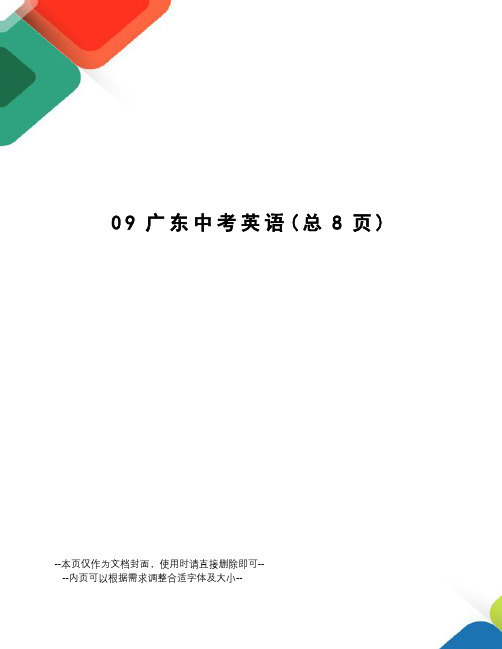
09广东中考英语(总8页)--本页仅作为文档封面,使用时请直接删除即可----内页可以根据需求调整合适字体及大小--2009年广东省初中毕业学业考试英 语 试 卷说明:1. 本次考试分为笔试(90分)和口试(10分)两部分,共100分,其中笔试(含听力测试题,其中第四大题为非选择题)共8页。
2. 考试时间90分钟,先进行听力测试,整体播放录音一遍,听力试题必须在20分钟内完成;笔试试题必须在70分钟内完成。
3. 本卷选择题(1-65)答案在答题卡上用2B 铅笔将相应的字母编号涂黑;非选择题答案写在答题卡的相应位置上。
答案写在试卷上一律不给分。
4. 答题前请在监考老师的指导下填好答题卡上的学校、姓名、考生号。
5. 请认真阅读答题卡上的注意事项。
第一卷(共四大题,共85分)一、听力部分(本大题共分ABCD 四部分,总分25分)A.听句子(本大题有5小题,每小题1分,共5分)根据句子的内容和所提的问题,选择符合题意的图画回答问题。
(每小题听一遍) ( )1. Where does he live?ABC( ) is the speaker?ABC( )’s Marry doing?A BC( ) is the speaker’s family photo?ABC( ) is Mr. Black?ABCB.听对话(本大题有10小题,每小题1分,共10分)回答每段对话后面的问题,在各题所给的三个选项中选出一个最佳答案。
(每段对话听两遍)听第1段对话,回答第6题。
( ) 6. How many chairs do the stude nts need in all C. Forty-two. A. Forty-eight B. Forty-nine.请听第二段对话,回答第7小题( )7. The boy was ______ yesterday afternoon. A. at home B. at the school C. on his birthday请听第三段对话,回答第8小题 ( )8. Where is Jim now? A. London. B. Beijing. C. Shanghai.请听第四段对话,回答第9小题 ( )9. What does the woman mean? A. She’ll go with the man. B. She can’t leave now. C. She doesn’t want to go with him. 请听第五段对话,回答第10小题( )10. What can we know from the dialogue? A. Tom lived here one year ago.B. Lucy doesn’t live here.C. Tom wanted to take a message for Lucy.请听第六段对话,回答第11-12小题 ( )11. What is Tom doing? A. He is writing a letter. B. He is reading a letter. C. He is doing homework.( )12. Where does Tom want to go for his university study? A. Beijing B. Shanghai C. New York请听第七段对话,回答第13-15小题( )13. How does the woman feel after the long trip? A. Very tired. B. OK. C. Quite sleepy. ( )14. How long will it take them to get home? A. A few minutes. B. About an hour. C. About two hours.( )15. Where does the dialogue happen?A. At the strain stationB. At the airportC. At the bus stopC.听短文(本大题有5小题,每小题1分,共5分)根据短文内容,在各题所给的三个选项中,选出一个最佳选项。
2009年广东省中考英语真题(含答案)

2009年广东省初中毕业生学业考试英语说明:1.全卷共10页,考试用时90分钟(其中听力考试约15分钟),满分为120分中听力部分30分)。
2.答题前考生必须将自己的姓名、准考证号按要求填写在密封线左边的空格内,并将姓名和准考证号写、涂在答题卡指定位置上。
3.试卷分试题和答卷,4个选项以下(含4个选项)的选择题答案在答题卡上作答超过4个选项的选择题和非选择题的答案在答卷上作答,写在试题上的答案无效4.使用答题卡作答,必须用规定的铅笔将答题卡上对应的小题所选的选项涂黑。
5.非选择题须用黑色或蓝色字迹的钢笔、圆珠笔按各题要求答在答卷上,不能用铅笔和红笔。
6.考试结束时,将试题、答卷和答题卡一并交回。
一.听力理解(本大题分为A、B、C、D四部分,共25小题,每小题1分,共25分)二、单项填空(本大题20小题,每小题1分,共20分)每小题的四个选项中,选出可以填入空白处的最佳答案。
( )26.There are ________ months in a year. October is the ________ month.A.twelve; ten B.twelfth; tenth C.twelve; tenth D.twelfth; ten( )27.—We have five kinds of schoolbags. Do you like this one?—No. Can you show me ________?A.another B.each other C.the other D.others( )28.The film “Kung Fu Panda” is ________ interesting ________ I would like to see it again.A.such; that B.too; to C.as; as D.so; that( )29.________ old man behind Mary is ________ university teacher.A.An; an B.A; the C.The; a D.The; an( )30.E-mail is very popular today. People seldom write letters now, ________?A.did they B.do they C.didn’t they D.don’t they( )31.The Changjiang River is the ________ river in China.A.lent B.longest C.short C.shorted( )32.Mike didn’t get get wet because his teacher ________ him an umbrella.A.lent B.discovered C.borrowed D.taught( )33.“It’s really very kind ____ you to help me with the housework on Sundays.” said Grandm a Huang.A.of B.with C.for D.from( )34.Sam ________ Chinese since he came to China. He speaks good Chinese now.A.learns B.learned C.has learned D.will learn( )35.We have to get up at 7:15 tomorrow morning, ________ we will be late for the 7:40 train.A.before B.or C.if D.so( )36.Don’t ________ others. Sometimes you make mistakes too.A.knock at B.laugh at C.look at D.arrive at( )37.Tom’s mother asked him ________ some washing after dinner.A.to do B.does C.do D.did( )38.If it ________ tomorrow, we will stay at home. We won’t go to the museum.A.rain B.rains C.will rain D.rained( )39.—Shush, be quiet! The baby ________ in the next room. —Ok. Sorry.A.sleep B.slept C.sleeps D.is sleeping( )40.Lily’s mother looked for her for half an hour, but could not find ________.A.what Lily was B.what was Lily C.where Lily was D.where was Lily( )41.________ terrible weather we had last Sunday.A.What B.What a C.Such D.How( )42.—________? —I have a headache.A.How do you do B.What do you doC.What’s wrong with you D.How do you like it( )43.—Mr. Wang, must I come again on Sunday morning to clean the windows?—No, you ________. I have asked others to do it.A.don’t have to B.mustn’t C.can’t D.shouldn’t( )44.—It’s really hot today. What drinks do we have in the fridge? —We have some ________.A.noodle B.cheese C.sausages D.lemonade( )45.The new library building ________ last week.A.was completed B.is completed C.completed D.has completed三、完形填空(本大题有10小题,每小题1分,共10分)通读下面短文,掌握其在意,然后在各小题所给的四个选项中,选出一个最佳答案。
2009年广东省深圳市中考英语试题(Word版-有答案)学习啊
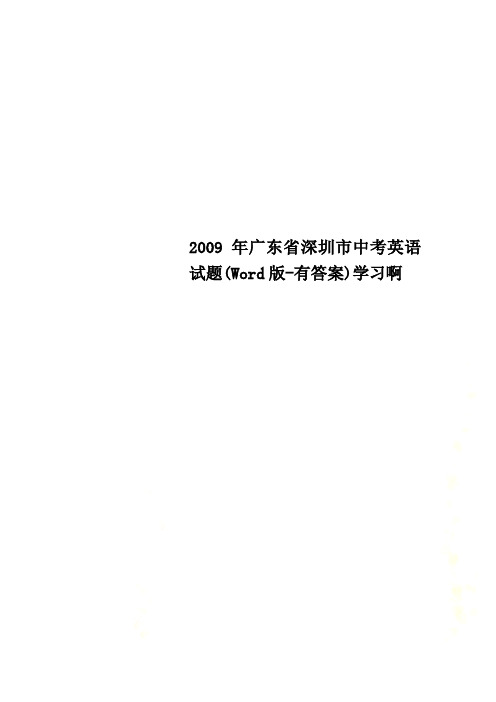
2009年广东省深圳市中考英语试题(Word版-有答案)学习啊学英语简单吗?肯定会有许多学生说:“难死了”。
为什么有好多学生对英语的学习都感到头疼呢?答案只有一个:“不得法。
” 英语与汉语一样都是一种语言,为什么你说汉语会如此流利?那是因为你置身于一个汉语环境中,如果你在伦敦呆上半年,保准说起英语来会非常流利。
但很多中学生没有很好的英语环境,那么你可以自己设置一个英语环境,坚持“多说”、“多听”、“多读”、“多写”,那么你的英语成绩肯定会很出色。
一、多“说”。
自己多创造机会与英语教师多讲英语,见了同学,尤其是和好朋友在一起时尽量用英语去问候,谈心情……这时候你需随身携带一个英汉互译小词典,遇到生词时查一下这些生词,也不用刻意去记,用的多了,这个单词自然而然就会记住。
千万别把学英语当成负担,始终把它当成一件有趣的事情去做。
或许你有机会碰上外国人,你应大胆地上去跟他打招呼,和他谈天气、谈风景、谈学校……只是别问及他的年纪,婚史等私人问题。
尽量用一些你学过的词汇,句子去和他谈天说地。
不久你会发现与老外聊天要比你与中国人谈英语容易的多。
因为他和你交谈时会用许多简单词汇,而且不太看重说法,你只要发音准确,准能顺利地交流下去。
只是你必须要有信心,敢于表达自己的思想。
如果没有合适的伙伴也没关系,你可以拿过一本书或其它什么东西做假想对象,对它谈你一天的所见所闻,谈你的快乐,你的悲伤等等,长此坚持下去你的口语肯定会有较大的提高。
二、多“听”寻找一切可以听英语的机会。
别人用英语交谈时,你应该大胆地去参与,多听听各种各样人的发音,男女老少,节奏快的慢的你都应该接触到,如果这样的机会少的话,你可以选择你不知内容的文章去听,这将会对你帮助很大,而你去听学过的课文的磁带,那将会对你的语言语调的学习有很大的帮助。
三、多“读”。
“读”可以分为两种。
一种是“默读”。
每天给予一定时间的练习将会对你提高阅读速度有很大的好处,读的内容可以是你的课本,但最好是一些有趣的小读物,因为现在的英语高考越来越重视阅读量和阅读速度。
2009年广东地区中考英语试题及标准答案
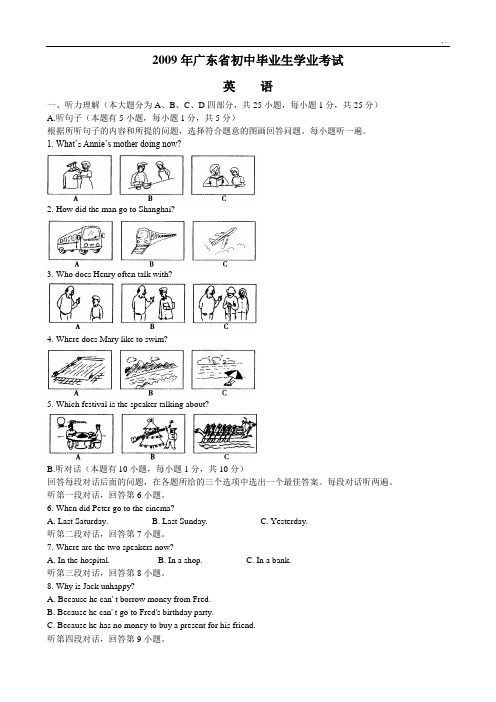
2009年广东省初中毕业生学业考试英语一、听力理解(本大题分为A、B、C、D四部分,共25小题,每小题1分,共25分)A.听句子(本题有5小题,每小题1分,共5分)根据所听句子的内容和所提的问题,选择符合题意的图画回答问题。
每小题听一遍。
1. What’s Annie’s mother doing now?2. How did the man go to Shanghai?3. Who does Henry often talk with?4. Where does Mary like to swim?5. Which festival is the speaker talking about?B.听对话(本题有10小题,每小题1分,共10分)回答每段对话后面的问题,在各题所给的三个选项中选出一个最佳答案。
每段对话听两遍。
听第一段对话,回答第6小题。
6. When did Peter go to the cinema?A. Last Saturday.B. Last Sunday.C. Yesterday.听第二段对话,回答第7小题。
7. Where are the two speakers now?A. In the hospital.B. In a shop.C. In a bank.听第三段对话,回答第8小题。
8. Why is Jack unhappy?A. Because he can' t borrow money from Fred.B. Because he can' t go to Fred's birthday party.C. Because he has no money to buy a present for his friend.听第四段对话,回答第9小题。
9. How long is the stone bridge?A. Nine meters.B. Ten meters.C. Eleven meters.听第五段对话,回答第10小题。
9广州中考英语试题与答案

9广州中考英语试题与答案2009年广州市中考英语试卷1.一IV.听力部分(略)V.语音(共10小题,每小题1分)1.指出各个句子中哪一个划线单词黑体部分的字母发音与其他划线单词黑体部分的字母VI.单项填空(共28小题,每小题1分)在下列各题的四个答案中选择一个最佳答案。
36. The boys arrived late at the cinema, and the start of the film.A. caughtB. missedC. gotD. lost37. —Guess, how much does it cost?—I think it costs 15 and 20 dollars.A. fromB. betweenC. amongD. with38. As we know, some people are good at but bad at giving back.A. lendingB. keepingC. borrowingD. using39. —Why couldn't you the correct spelling of the word?—Err. . . I hadn't got a Chinese-English dictionary at hand.A. look forB. look downC. look upD. look at40. —You look very tired this morning. What did you do yesterday afternoon?—I did Christmas shopping.A. a lot ofB. a few ofC. a number ofD. a piece of41. —Would you mind looking after my dog while I'm on holiday?— .A. Of course notB. Yes. I'd be happy toC. Not at all. I've no timeD. Yes, please42. —What can I do for you?—A. Yes, you can give a skirt to meB. I'd like a skirtC. No, I can do it myselfD. I can do what I want43. After school we usually play basketball for half an hour on playground.A. the。
2009年广州市中考英语真题及答案

2009年广州市中考英语试题1.一IV.听力部分(略)V.语音(共10小题,每小题1分)VI.单项填空(共28小题,每小题1分)在下列各题的四个答案中选择一个最佳答案。
36. The boys arrived late at the cinema, and the start of the film.A. caughtB. missedC. gotD. lost37. —Guess, how much does it cost?—I think it costs 15 and 20 dollars.A. fromB. betweenC. amongD. with38. As we know, some people are good at but bad at giving back.A. lendingB. keepingC. borrowingD. using39. —Why couldn't you the correct spelling of the word?—Err. . . I hadn't got a Chinese-English dictionary at hand.A. look forB. look downC. look upD. look at40. —You look very tired this morning. What did you do yesterday afternoon?—I did Christmas shopping.A. a lot ofB. a few ofC. a number ofD. a piece of41. —Would you mind looking after my dog while I'm on holiday?—.A. Of course notB. Yes. I'd be happy toC. Not at all. I've no timeD. Yes, please42. —What can I do for you?—A. Yes, you can give a skirt to meB. I'd like a skirtC. No, I can do it myselfD. I can do what I want43. After school we usually play basketball for half an hour on playground.A. the; theB. 不填;不填C. 不填; theD. the;不填44. Each of us has to write a report every two weeks.A. two-hundred-wordB. two-hundreds-wordC. two-hundreds-wordsD. two-hundred-words45. —Which would you like to drink, coffee or orange juice?— . Please give me a cup of tea.A. NeitherB. BothC. A11D. None46. An old friend of my sister's always helps my brother and with English.A. I; ourB. me; ourselvesC. I; myD. me; our47. The little boy ate a big meal he said he wasn't hungry.A. ifB. thoughC. becauseD. as48. —What do you like doing after class?—I like not only reading painting.A. andB. but alsoC. orD. for49. We love to go to the country in spring as the flowers smell so .A. wellB. niceC. wonderfullyD. nicely50. The letter from my uncle was short. There wasn't news.A. manyB. a fewC. muchD. few51. The boy doesn't speak his sister, but his written work is very good.A. as well asB. so good asC. more better thanD. more worse than52. —When did your uncle arrive China?—He got to Guangzhou the morning of the 16th of April.A. at; inB. in; inC. to; onD. in; on53. The food my country is quite different that here.A. in; likeB. to; fromC. from; toD. in; from54. way it is from Guangzhou to Paris!A. How longB. What a longC. How a longD. What long55. —I take some photos in the hall?—No, you .A. Can; needn'tB. Must ; mustn'tC. Could; won'tD. May; mustn't56. —What is the weather like this summer here?—There very little rain.A. hasB. has beenC. areD. have been57. If you carefully, you the report well.A. will listen; will be understoodB. will listen; understandC. listen; will understandD. listen; understand58. They about eight hundred English words by the end of last term.A. will learnB. had learnedC. are going to learnD. have learned59. Excuse me, sir. Could you tell me ?A. where is the bank nearestB. where is the nearest bankC. where the nearest bank isD. the nearest bank is where60. —How did the accident happen?—You know, it difficult to see the road clearly because it .A. was; was rainingB. is; has rainedC. is; is rainingD. will be; will rain61. —Hi, Tom! Can you tell me when for London?—Yes, tomorrow afternoon.A. leavingB. leavesC. to leaveD. are you leaving62. Don't worry. All the children by the nurses.A. are well taken care ofB. take good care ofC. are taken good careD. take good care63. Have you your new classmates yet?A. had friends withB. made friend withC. got friend toD. made friends with67. A. tell B. report C. telephone D. find68. A. at B. through C. above D. on69. A. old B. difficult C. free D. clear70. A. arm-chair B. window C. house D. road71. A. arrived B. fought C. left D. returned72. A. so B. for C. and D. but73. A. up and down B. again and again C. hour after hour D. from side to sideVIII.阅读理解(共12小题,每小题1分)阅读下面的短文,然后根据短文内容选择最佳答案。
9广州中考英语试题与答案

2009年广州市中考英语试卷1.一IV.听力部分(略)V.语音(共10小题,每小题1分)1.指出各个句子中哪一个划线单词黑体部分的字母发音与其他划线单词黑体部分的字母VI.单项填空(共28小题,每小题1分)在下列各题的四个答案中选择一个最佳答案。
36. The boys arrived late at the cinema, and the start of the film.A. caughtB. missedC. gotD. lost37. —Guess, how much does it cost?—I think it costs 15 and 20 dollars.A. fromB. betweenC. amongD. with38. As we know, some people are good at but bad at giving back.A. lendingB. keepingC. borrowingD. using39. —Why couldn't you the correct spelling of the word?—Err. . . I hadn't got a Chinese-English dictionary at hand.A. look forB. look downC. look upD. look at40. —You look very tired this morning. What did you do yesterday afternoon?—I did Christmas shopping.A. a lot ofB. a few ofC. a number ofD. a piece of41. —Would you mind looking after my dog while I'm on holiday?— .A. Of course notB. Yes. I'd be happy toC. Not at all. I've no timeD. Yes, please42. —What can I do for you?—A. Yes, you can give a skirt to meB. I'd like a skirtC. No, I can do it myselfD. I can do what I want43. After school we usually play basketball for half an hour on playground.A. the。
2009年广东省深圳市中考英语试题(Word版-有标准答案)

英语作文常用谚语、俗语1、A liar is not believed whenhespeaks the t ruth.说谎者即使讲真话也没人相信。
2、A littleknowledge is a dangerous thing. 一知半解,自欺欺人。
3、Allrivers run intosea. 海纳百川。
4、Allroads leadtoRome. 条条大路通罗马。
5、All work and no play makes Jack adull boy.只会用功不玩耍,聪明孩子也变傻。
6、Abad beginning makes a bad ending.不善始者不善终。
7、Actions speak louder than words. 事实胜于雄辩。
8、Afaithfulfriend is hard to find. 知音难觅。
9、A friend in needis a friend indeed.患难见真情。
10、A friend is easierlost than found.得朋友难,失朋友易。
11、A good beginning is half done.良好的开端是成功的一半。
12、A goodbeginningmakesagoodending.善始者善终。
13、A good book isagood friend. 好书如挚友。
14、Agood medicine tastes bitter.良药苦口。
15、A mother'slovenever changes.母爱永恒。
16、An apple aday keeps the doctor away. 一天一苹果,不用请医生。
17、A single flowerdoes not makea spring.一花独放不是春,百花齐放春满园。
18、A year's planstartswithspring. 一年之计在于春。
2009年广东省湛江市中考英语试题及答案

湛江市2009年初中毕业生学业考试英 语 试 卷本试卷满分为135分。
考试用时80分钟。
注意事项:1、答卷前,考生务必用黑色字迹的钢笔或签字笔将自己的姓名和准考证号等相关信息填写在答题卡上。
2、选择题每小题选出答案后,用2B 铅笔把答题卡上对应题目的答案标号涂黑;如需改动,用橡皮擦干净后,再选涂其他答案;不能答在试卷上。
3、非选择题必须用黑色字迹钢笔或签字笔作答,答案必须写在答题卡各题目指定区域内的相应位置上;如需改动,先划掉原来的答案,然后再写上新的答案;不准使用铅笔和涂改液。
不按以上要求作答的答案无效。
4、考生必须保持答题卡的整洁,考试结束,将本试卷和答题卡一并交回。
I. 听力 (共三节,满分20分)做题时,先将答案划在试卷上。
录音内容结束后,你将有两分钟的时间将试卷上听力选择题的答案转涂到答题卡上,将―听对话或短文获取信息‖的答案填在答题卡标号为16—20的空格中。
第一节: 听对话选图画(共5小题,每题1分,满分为5分)听下面5段对话,每段对话后有一个问题,听完后,从题中所给的A 、B 、C 三幅图画中选出符合对话内容的图画,并在答题卡上将该项涂黑。
每段对话听一遍。
听第1段材料,回答第1题。
1. What does the girl want to buy?A B C听第2段材料,回答第2题。
2. What does Jim like playing?A B C听第3段材料,回答第3题。
3. When is the woman arriving?A B C听第4段材料,回答第4题。
4. How much is the MP3?A. B. C.听第5段材料,回答第5题。
5. Where is her pen pal from?A B C第二节:听对话或短文选答案(共10小题,每题1分,满分为10分)听下面对话或短文,每段对话或短文后各有几个问题,从题中所给的A、B、C三个选项中选出最佳选项,并在答题卡上将该项涂黑。
2009年广东省佛山市中考英语试题

2009年⼴东省佛⼭市中考英语试题2009年⼴东省佛⼭市中考英语试题(满分120分,考试时间90分钟)⼀、听⼒(共两节,满分20分)第⼀节听⼒理解(共15⼩题;每⼩题1分,满分15分)听下⾯⼀段对话,回答1,2两个⼩题。
1. How much pocket money does Lucy get every week?A. One dollarB. Three dollarsC. Five dollars.2. What does "Edward advise Lucy to do?A. To ask her mother for help.B. To help her mother do housework.C. To look for some money in the house.听下⾯⼀段对话,回答3?5三个⼩题。
3. When did those people go to do sports?A. Yesterday afternoon.B. Last MondayC. Last Friday.4. What sport did Tom do?A. TennisB. VolleyballC. Basketball.5. Who played table tennis well?A. SamB. SusanC. Paul.听下⾯⼀段对话,回答6?8三个⼩题。
6. What did Simon give to Annie?A. A jacketB. A bookC. A card.7. Who gave the most expensive present?A. MaryB. HarryC. Linda.8. What does Annie think of the purple hat?A. She loves itB. She doesn't like itC. She thinks it's cheap., 听下⾯⼀段对话,回答9?11三个⼩题。
2009年广东省佛山市中考英语试题

2009年广东省佛山市中考英语试题(满分120分,考试时间90分钟)一、听力(共两节,满分20分)第一节听力理解(共15小题;每小题1分,满分15分)听下面一段对话,回答1,2两个小题。
1. How much pocket money does Lucy get every week?A. One dollarB. Three dollarsC. Five dollars.2. What does "Edward advise Lucy to do?A. To ask her mother for help.B. To help her mother do housework.C. To look for some money in the house.听下面一段对话,回答3〜5三个小题。
3. When did those people go to do sports?A. Yesterday afternoon.B. Last MondayC. Last Friday.4. What sport did Tom do?A. TennisB. VolleyballC. Basketball.5. Who played table tennis well?A. SamB. SusanC. Paul.听下面一段对话,回答6〜8三个小题。
6. What did Simon give to Annie?A. A jacketB. A bookC. A card.7. Who gave the most expensive present?A. MaryB. HarryC. Linda.8. What does Annie think of the purple hat?A. She loves itB. She doesn't like itC. She thinks it's cheap., 听下面一段对话,回答9〜11三个小题。
2009广州市九年级英语中考

2009年广东省广州市中考英语试题二、语言知识及运用(共两节,满分20分)第一节单项选择(共10小题;每小题1分,满分10分)16. —What would you like for afternoon tea?一Two pieces of bread and cup of coffee, please.A. an; aB.不填;aC. a; theD.不填;the17. ―Doctor, what's the problem wit h my son?―Don't worry. It is serious. It's only a cold.A. nothingB. somethingC. anythingD. everything18. —When did Peter leave Shanghai?―He left Shanghai the evening of October 15.A. inB. atC. onD. till19. 一I'm going to the post office this afternoon. Could you pick me up at three?―Sorry. I . I'll be in a meeting then.A. shouldn'tB. mustn'tC. needn'tD. can't20. As the 2010 Asian Games get closer, Guangzhou is becoming than ever.A. beautifulB. most beautifulC. more beautifulD. almost beautiful21. My uncle hurried to the airport but the plane had already .A. run awayB. put onC. got upD. taken off22. Mr. Green wants to travel around the world because he enjoys new places.A. to seeB. seeingC. seesD. see23. ―There's something wrong with my comp uter.―Don't worry. I to repair it tomorrow.A. will comeB. cameC. comeD. have come24. Sally has returned to Guangzhou, ?A. did sheB. didn't sheC. has sheD. hasn't she25. I'll never forget the day I became a middle school student.A. whereB. whenC. whyD. which第二节语法选择(共10小题;每小题1分,满分10分)Homework can put you in a bad mood(情绪),but that might be a good thing. rNew research shows that being too happy can sometimes 26 your learning performance.Researchers wanted to know 27 mood would affect(影响)the way children learn. So they decided to do a study.In the study, each child 28 20 problems. In each problem a small shape was hidden inside a different, larger shape. The children had to find the small shape while they were listening to either happy 29 sad music.To measure their mood, the researchers asked the children 30 to one of the five faces, from laughing 31 crying. Children 32 listened to happy music pointed to the smiling faces, showing that they felt 33 . Children who listened to sad music pointed to the crying faces instead.The researchers found that sad children took less time to find the small shapes.They also correctly found three or more shapes.The researchers think that sadness 34 people pay more attention(注意)to small facts. 35 people feel unhappy, they are more careful with a problem or difficult situation.26. A. hurting B. to hurt C. hurt D. to be hurt27. A. whether B. where C. that D. because28. A. gave B. is giving C. was given D. gives29. A. nor B. or C. and D. but30. A. point B. pointing C. pointed D. to point31. A. of B. to C. in D. with32. A. who B. whom C. whose D. which33. A. exciting B. excitedly C. excitement D. excited34. A. make B. makes C. is making D. is made35. A. So B. But C. When D. Though三、完形填空(共10小题;每小题1分,满分10分)Years ago a farmer owned land near the sea. He always needed workers to help him, but most people did not want to work on farms near the sea. They were 36 of the terrible storms that often hit and destroyed(毁坏)buildings and plants.Finally, a short man came to the farmer. "Are you a good worker?" the farmer asked him. "Well, I can sleep when the wind blows," answered the little man. Although surprised by this answer, the farmer, who really needed 37 , gave him the job. The little man 38 very hard on the farm, and the farmer felt 39 with his work.Then one night the wind blew loudly in from the sea. Jumping out of bed, the farmer 40 to the short man's room. The farmer shouted, "Get up! A 41 is coming! Tie(系)things down before they blow away!" But the little man lay in bed 42 and said, "No sir. I told you, I can sleep when the wind blows."Hearing the words, the farmer hurried outside to 43 the storm on his own. To his surprise, he found that everything was tied down and nothing could blow away. The farmer then 44 what the short man meant, so he returned to his bed to sleep while the wind blew.When you're prepared, you have nothing so worry about. Can you 45 when the wind blows through your life?36. A. afraid B. sure C. careful D. glad37. A. money B. experience C. help D. time38. A. stayed B. worked C. moved D. slept39. A. worried B. angry C. sorry D. pleased40. A. rushed B. fell C. left D. returned41. A. man B. storm C. snake D. boat42. A. lazily B. quickly C. badly D. hardly43. A. wait for B. call for C. look for D. prepare for44. A. asked B. understood C. heard D. wondered45. A. work B. stand C. sleep D. live四、阅读理解(共20小题;每小题2分,满分40分)AA Country Mouse once invited his city cousin to visit him on the farm. He planned to show the City Mouse how happy life in the countryside could be. But there had been no rain that summer and the earth was very dry. Nothing would grow. As the two mice sat eating some rice they had been able to find, and looked over the dead fields, the City Mouse said, "Dear cousin, your life seems so hard here. Why don't you come to the city with me where I can give you anything you want?"The Country Mouse loved his home and had never left it before. Although life was sometimes difficult, he could always find enough to eat. But the City Mouse would not give up. He told the Country Mouse of the big dinners he would enjoy every evening and the bright lights that made the night in the city seem like day. Finally the Country Mouse agreed to go to the city with him. When they arrived, true to his word, the City Mouse prepared a big dinner of fresh bread, fruit, cheese and chocolate cake.Just as they were about to eat, the door flew open and in came a woman, the home's owner, who ran angrily at the mice. They quickly ran away through a small hole in the wall, but things went from bad to worse. They found themselves on a busy street, facing hundreds of human feet and worst of all, dozens of fast traveling cars. The Country Mouse was scared, hungry and did not know what to do. When he turned to his cousin for help, he saw the City Mouse was already far away, running into a dark, quiet street.After his cousin had gone, the Country Mouse thought to himself, "Oh, why did I leave my simple life for the city? Although it was hard, at least I lived in safety and without fear.“46. The City Mouse didn't like the countryside because .A. the weather was wetB. there was no food to eatC. life was too difficultD. there was nothing to do47. Why did the mice rush out of the house?A. They wanted to run away from the angry woman.B. There were too many people inside.C. They wanted to see the cars outside.D. They were feeling very hungry.48. What scared the Country Mouse most in the city?A. The dark and quiet street.B. The owner of the house.C. The bright lights on the street.D. The many fast traveling cars.49. Which of the following is TRUE according to the story?A. The Country Mouse had never been to the city before.B. The City Mouse helped his cousin a lot.C. There were many dark and quiet streets in the city.D. The Country Mouse had a lot of friends in the city.50. Where did the Country Mouse most probably go at the end of the story?A. Into a hole in the wallB. Into the woman's house.C. To a car on a streetD. To his home in the countryside.BAmericans buy more bottled water than any other nation in the world. 29 billion bottles of water are drunk each year. It takes 17 million barrels of crude oil to make these bottles. That's enough oil to keep a million cars going for twelve months.So why don't more people drink water from the tap(水龙头)in the kitchen? Some people drink bottled water because they think it is better for them than water out of the tap, but that's not true. In the United States, the government makes sure water from the tap is safe.People love bottled water because it is convenient(便利的)to take with them. But maybe if they understand the problems it makes, they will try drinking from a glass at home or carrying water in a reusable bottle instead of a plastic one. Although plastic water bottles can be turned into some other useful things, only a small number of them are reused. The rest are taken away in rubbish trucks, or even worse, they end up as rubbish on the land and in rivers, lakes, and the ocean. Plastic bottles take hundreds of years to break down.Water is good for you, so keep drinking it. But think about how often you use plastic water bottles, and see if you can make a change. If you take one to school, don't throw it away一bring it home and put tap water in it for the next day.51. How many plastic water bottles do Americans use every year?A. 1 millionB. 17 millionC. 12 billionD. 29 billion.52. Why do Americans love bottled water?A. It's good for the environmentB. It is easy to carry.C. It is cheapD. It is good for their health.53. The underlined word "they"(paragraph 3) refers to " ”A. the problemsB. the bottlesC. the rubbish trucksD. the glasses54. Which of the following is TRUE according to the passage?A. It takes a long time to make plastic water bottles.B. Only a few plastic water bottles are reused.C. Plastic water bottles are made from useless things.D. People who drink tap water are healthier.55. What can we learn from the passage?A. It is important to save water.B. We should use less oil.C. We should use fewer plastic water bottles.D. It is good to drink a lot of bottled water.CThis summer holiday, if you want to learn something new, make new friends or just have some fun,55. Where can you probably read this course information?A. On the InternetB. In a dictionaryC. In a diaryD. In a story book.56.Which of the following is TRUE about Course A?A. The course is only for beginners.B. The course will run for the whole morning.C. You will learn different swimming strokes.D. You will learn to swim 50 metres without stopping.57.Susan is interested in sports and music but she doesn't have much money. Which course will she choose?A. Course A.B. Course B.C. Course CD. Course D.58.The underlined words "have a voice" mean " “.A. can be heardB. have a sore throatC. can sing wellD. like singing59.What do we know about these courses?A. All the courses will be held on weekdays.B. Each course gives you a lot of practice.C. There are one or more trainers for each course.D. Experience isn't needed for some courses.DThe world may be a big place but when it comes to teenagers' reading habits(习 ),the differences are quite small.Recently young people from Japan, Brazil, China and England were asked estions about what, why and how often they read. The study, done by London liversity, wanted to find out if there were any important differences in teenagers' iding habits.In the study, 200 teenagers from each of the four countries were asked to make a t of what they read in a week. They were been asked to write down why they read :h thing on their lists. Finally the teenagers said how much time they spent reading :h thing in a week.Here is some of what was found out. On average(平均)teenagers read for 17. 5 urs per week. Japanese teenagers read for 18. 5 hours per week, a little more than )se from China(18 hours) , Brazil(17 hours) and England(16. 5 hours). Teenagers inly read for two different reasons: "for study" and "for fun". In each country, !y spent 60% of their reading time "for study" and 40% "for fun". Reading "for cly" took so much of teenagers' time as most of them are still atschool.The study also found what teenagers read was almost the same. Course books were the only thing they read " for study", but when it came to reading " for fun", teenagers most often mentioned newspapers, cartoons, sports magazines and story books (for more information, see the picture).Time teenagers spent on reading "for fun"61. How many teenagers took part in the study?A. 200B. 400C. 600D. 80062. What is the third paragraph(段落)about?A. Who did the studyB. When the study was done.C. How the study was doneD. Why the study was done.63. Who spent the most time reading according to the study?A. Japanese teenagersB. Chinese teenagers.C. Brazilian teenagersD. English teenagers.64. Why did teenagers spend more time reading "for study" than reading "for fun"?A. Because most teenagers are still at school.B. Because teenagers think reading "for study" is more interesting.C. Because teenagers feel happier when reading "for study".D. Because there are fewer things for them to read "for fun".65. According to the picture, what is the most popular thing to read "for fun"?A. Story booksB. Sports magazines.C. NewspapersD. Cartoons.五、写作(满分30分)第一节单词拼写(共5小题;每小题1分,满分5分)根据下列句子及所给单词的首字母写出所缺单词。
广东中考英语
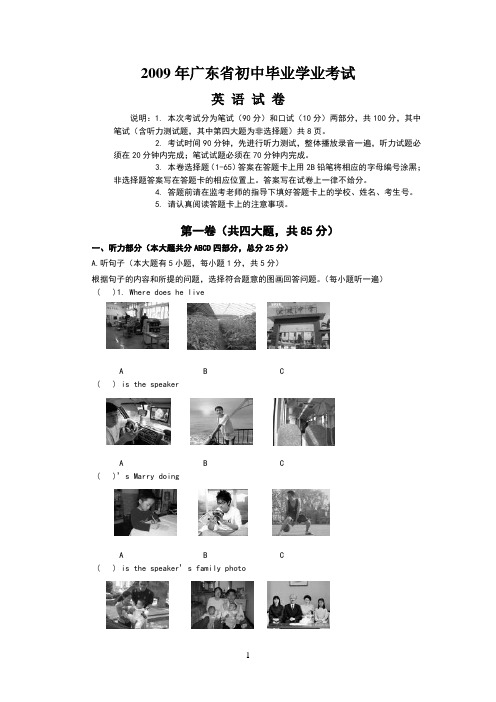
2009年广东省初中毕业学业考试英 语 试 卷说明:1. 本次考试分为笔试(90分)和口试(10分)两部分,共100分,其中笔试(含听力测试题,其中第四大题为非选择题)共8页。
2. 考试时间90分钟,先进行听力测试,整体播放录音一遍,听力试题必须在20分钟内完成;笔试试题必须在70分钟内完成。
3. 本卷选择题(1-65)答案在答题卡上用2B 铅笔将相应的字母编号涂黑;非选择题答案写在答题卡的相应位置上。
答案写在试卷上一律不给分。
4. 答题前请在监考老师的指导下填好答题卡上的学校、姓名、考生号。
5. 请认真阅读答题卡上的注意事项。
第一卷(共四大题,共85分)一、听力部分(本大题共分ABCD 四部分,总分25分) A.听句子(本大题有5小题,每小题1分,共5分)根据句子的内容和所提的问题,选择符合题意的图画回答问题。
(每小题听一遍) ( )1. Where does he liveABC( ) is the speakerABC( )’s Marry doingABC( ) is the speaker’s family photoAB C( ) is Mr. BlackABCB.听对话(本大题有10小题,每小题1分,共10分)回答每段对话后面的问题,在各题所给的三个选项中选出一个最佳答案。
(每段对话听两遍)听第1段对话,回答第6题。
( ) 6. How many chairs do the stude nts need in all C. Forty-two. A. Forty-eight B. Forty-nine.请听第二段对话,回答第7小题( )7. The boy was ______ yesterday afternoon. A. at home B. at the school C. on his birthday请听第三段对话,回答第8小题 ( )8. Where is Jim now A. London. B. Beijing. C. Shanghai. 请听第四段对话,回答第9小题( )9. What does the woman mean A. She’ll go with the man. B. She can’t leave now. C. She doesn’t want to go with him.请听第五段对话,回答第10小题( )10. What can we know from the dialogue A. Tom lived here one year ago.B. Lucy doesn’t live here.C. Tom wanted to take a message for Lucy.请听第六段对话,回答第11-12小题 ( )11. What is Tom doing A. He is writing a letter. B. He is reading a letter. C. He is doing homework.( )12. Where does Tom want to go for his university study A. Beijing B. Shanghai C. New York 请听第七段对话,回答第13-15小题( )13. How does the woman feel after the long trip A. Very tired. B. OK. C. Quite sleepy. ( )14. How long will it take them to get home A. A few minutes. B. About an hour. C. About two hours. ( )15. Where does the dialogue happen A. At the strain station B. At the airportC. At the bus stopC.听短文(本大题有5小题,每小题1分,共5分)根据短文内容,在各题所给的三个选项中,选出一个最佳选项。
